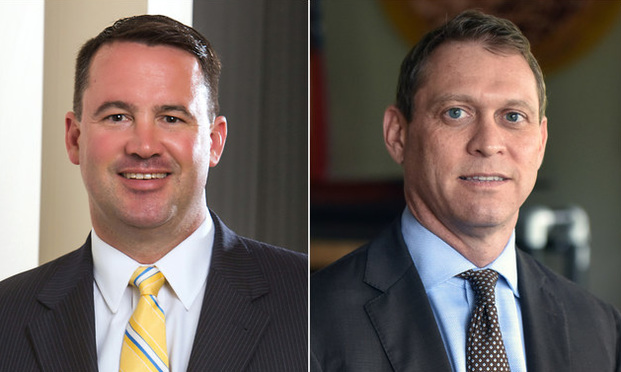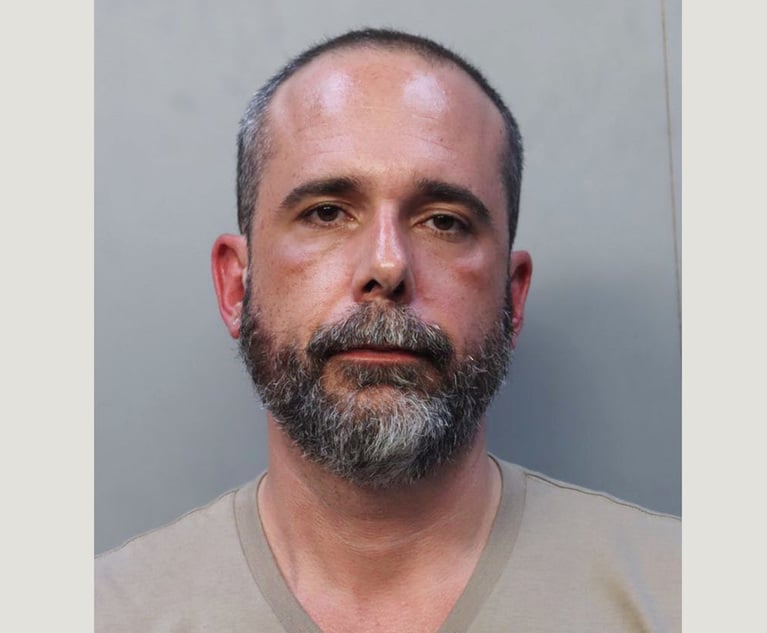Lawyers Say There's No Defense for Broward Day Care After Toddler's Death in Hot Van
"There is no mitigation or excuse that says, 'Well, under certain circumstances, it's OK to not know that there's a child in the car,' " said Coral Gables civil litigator Christopher Marlowe, weighing the likelihood of a civil suit after a 2-year-old was found dead in a van outside a Broward day care center Monday.
July 30, 2019 at 05:21 PM
8 minute read
 Christopher Marlowe, left, of the Haggard Law Firm and John Uustal of Kelley Uustal in Fort Lauderdale consider civil litigation options after a 2-year-old was found dead in a hot day care van Monday.
Christopher Marlowe, left, of the Haggard Law Firm and John Uustal of Kelley Uustal in Fort Lauderdale consider civil litigation options after a 2-year-old was found dead in a hot day care van Monday.
On Monday afternoon, a Broward day care employee discovered the body of 2-year-old Noah Sneed, who had been left in the company's van since it arrived in the morning.
Ceressa's Day Care and Preschool in Oakland Park used the van to bring children to and from its center. It did not respond to a phone call seeking comment, and has reportedly closed down while the Broward Sheriff's Office investigates.
But now, South Florida litigators say the case screams of criminal prosecution and civil litigation, with attorneys from defense and plaintiff bars seemingly agreeing the day care center and its employees would likely flounder in court.
Fort Lauderdale trial attorney John Uustal of Kelley Uustal said the child's parents could pursue a civil lawsuit with negligence claims, and potentially other legal violations under Florida's Wrongful Death Act.
To prove negligence, the plaintiffs would have to show the day care center or its staff acted in a way that is unreasonable considering its position. And this case checks the “foreseeable negligence” box, as Uustal sees it.
“It's easily foreseeable that if a child is left in a van in Florida, that they might die,” he said.
There might also be other negligence claims available, Uustal said, considering no one noticed that the child wasn't inside the facility until around 3 p.m.
Indefensible?
It would be “almost impossible” to defend a negligence claim over this incident, according to civil defense attorney Dale Hightower of Hightower, Stratton, Novigrod & Kantor in Miami, who said it reminded him of the case where a toddler who was killed by an alligator at Disney World.
Disney didn't deny it was to blame and the family didn't sue, though there were reports of a confidential settlement, which is what Hightower would recommend if he were defending the day care center.
“You might as well do the right thing,” Hightower said. “And the right thing is for the company to accept responsibility and try to make changes in their company policies to keep that from happening again and try to reach a reasonable settlement.”
It also comes down to public image for the client, he said.
“If you do the right thing and say, 'We're sorry it happened, we're responsible and we're going to compensate the family for the loss of their child,' that's just good public relations for the company,” Hightower said.
For Christopher Marlowe of the Haggard Law Firm in Coral Gables, who specializes in litigation around wrongful death, negligent security and pool drownings, a successful civil case against the day care center would require scrutiny of the driver, the person who entrusted him or her with the van, and what training that driver had received.
“I don't want to prejudge it, but I would be shocked if they received a level of training commensurate with the dangers, especially in South Florida, of leaving kids in cars,” Marlowe said.
It's also important to consider who the defendant is, according to Marlowe.
“This isn't a grieving parent, relative or friend, who was busy and doing a favor picking up the child,” Marlowe said. “This company is in the business of, and presumably receiving money for, the professional care of children.”
The way Marlowe sees it, there's no defense.
“There just simply isn't one. The only remaining question is to find out how many people or how many entities are responsible for it,” he said. “But there is no mitigation or excuse that says, 'Well, under certain circumstances, it's OK to not know that there's a child in the car.' ”
Faced with a wrongful death lawsuit in this scenario, a defendant would be wise to “ throw themselves at the mercy of the plaintiff,” in Marlowe's opinion, which would mean conceding liability and leaving damages as the only question.
Danielle Cohen Higgins of the Cohen Law Firm in Miami has handled wrongful death and personal injury cases against day care centers in Florida, and agreed this case would be difficult to defend.
“I would assume, based on my 13 years of experience, that [the defendant] would not want this litigated, that they would want this resolved sooner rather than later, instead of playing out in a courtroom with media and the press following every step of the case,” she said.
Cohen Higgs said she can't see a scenario under which the child's family wouldn't want legal recourse through a wrongful death claim, possibly with punitive damages too, considering how “egregious” the facts appear.
“No dollar amount will ever bring back a loved one, and that's always the unfortunate conversation I have to have with my clients,” she said. “But it's the best legal system in the world, arguably, and it's the system that we have created to somehow compensate for the impossible, which is losing a loved one.”
Robert Boyers of the Boyers Law Group in Miami said the facts, while still emerging, seem to demonstrate the indefensible neglect of a child. Boyers handled a similar case in the Florida Keys. In that case, the child didn't die, but suffered heat stroke and temporary diminished function after being left on a hot bus. The litigation settled confidentially.
 Robert Boyers. Courtesy photo.
Robert Boyers. Courtesy photo.“That was a situation where they didn't have the proper number of staff on the bus, and they didn't go through a checklist and make sure that the number of kids that got on the bus matched the number of kids that got off the bus,” Boyers said.
That's where industry standards come in, according to Boyers, who said a plaintiffs attorney would have to look at training, staff ratios and professional backgrounds, and whether there were any prior incidents at the day care center.
Regulatory agencies such as the Florida Department of Children and Families, in Boyers' experience, don't always have the resources to inspect and police day care centers to ensure compliance. That means legal accountability and financial penalties don't often match the alleged negligence, he said.
“All too often, we have to wait until a catastrophic event like this one occurs before the punishment really fits with a deviation from appropriate safety standards,” Boyers said.
Boyers recommends parents seek out day care centers with a gold seal of approval, a standard of care that's not required, but considered higher caliber in terms of education and safety.
Uustal pointed out that in situations like the one involving the Broward day care, the only possibility to recover damages would lie in the company's insurance policy, assuming there is one. According to Uustal, most states have more stringent insurance requirements than Florida.
“It's very, very common for people to be injured in the state of Florida and they're just out of luck,” he said. “Even though there's clear negligence, there's nothing that can be done because people don't have insurance.”
A catalyst?
Civil litigators such as Cohen Higgins aim to plug that gap, using lawsuits as a way to incentivize compliance.
“I have to believe that there is a measure of heightened standard as a result of trial attorneys holding those accountable when tragedies like this happen,” Cohen Higgins said.
Twenty-four children, including Sneed, have died in hot cars across the country so far in 2019, according to KidsandCars.org, which campaigns on the issue.
One of the latest deaths happened Friday, when a New York man left his 1-year-old twins in the car while he went to work, having forgotten to drop them off at day care. The babies died, and he was charged with manslaughter and criminally negligent homicide.
Where companies are involved in a child's death, Marlowe said he's often heartened to see defendants have changed their ways after a major lawsuit.
“When I go back to visit the site of a tragedy, I have more times than not seen meaningful changes from the way it was when my client was injured or killed,” he said.
Hightower noted that some modern cars come with sensors that remind the driver to look in the backseat before getting out, which could be something for day care centers to consider using.
No matter the outcome, representing families who've lost a child is excruciating, in Boyers' experience.
“All you want to do is ease their pain, and you hope that getting them answers and holding the responsible parties legally accountable will help them to heal,” he said. “I also find that when parents know that their lawsuit is helping to make that and other day care centers safer for other kids, they find this tremendously empowering. Over time, it helps them to find closure.”
Related stories:
Broward Lawyers Negotiate $27M for Toddler Burned in Pressure Cooker Explosion
Miami Lawyers Land High-Profile Suit Against Royal Caribbean Over Toddler's Deadly Fall
This content has been archived. It is available through our partners, LexisNexis® and Bloomberg Law.
To view this content, please continue to their sites.
Not a Lexis Subscriber?
Subscribe Now
Not a Bloomberg Law Subscriber?
Subscribe Now
NOT FOR REPRINT
© 2025 ALM Global, LLC, All Rights Reserved. Request academic re-use from www.copyright.com. All other uses, submit a request to [email protected]. For more information visit Asset & Logo Licensing.
You Might Like
View All
Auto Dealers Ask Court to Pump the Brakes on Scout Motors’ Florida Sales
3 minute read
Saul Ewing Loses Two Partners to Fox Rothschild, Marking Four Fla. Partner Exits in Last 13 Months
3 minute read
Trending Stories
- 1CFPB Labor Union Files Twin Lawsuits Seeking to Prevent Agency's Closure
- 2Crypto Crime Down, Hacks Up: Lawyers Warned of 2025 Security Shake-Up
- 3Atlanta Calling: National Law Firms Flock to a ‘Hotbed for Talented Lawyers’
- 4Privacy Suit Targets Education Department Over Disclosure of Student Financial Data to DOGE
- 5Colwell Law Group Founder Has Died in Skiing Accident
Who Got The Work
J. Brugh Lower of Gibbons has entered an appearance for industrial equipment supplier Devco Corporation in a pending trademark infringement lawsuit. The suit, accusing the defendant of selling knock-off Graco products, was filed Dec. 18 in New Jersey District Court by Rivkin Radler on behalf of Graco Inc. and Graco Minnesota. The case, assigned to U.S. District Judge Zahid N. Quraishi, is 3:24-cv-11294, Graco Inc. et al v. Devco Corporation.
Who Got The Work
Rebecca Maller-Stein and Kent A. Yalowitz of Arnold & Porter Kaye Scholer have entered their appearances for Hanaco Venture Capital and its executives, Lior Prosor and David Frankel, in a pending securities lawsuit. The action, filed on Dec. 24 in New York Southern District Court by Zell, Aron & Co. on behalf of Goldeneye Advisors, accuses the defendants of negligently and fraudulently managing the plaintiff's $1 million investment. The case, assigned to U.S. District Judge Vernon S. Broderick, is 1:24-cv-09918, Goldeneye Advisors, LLC v. Hanaco Venture Capital, Ltd. et al.
Who Got The Work
Attorneys from A&O Shearman has stepped in as defense counsel for Toronto-Dominion Bank and other defendants in a pending securities class action. The suit, filed Dec. 11 in New York Southern District Court by Bleichmar Fonti & Auld, accuses the defendants of concealing the bank's 'pervasive' deficiencies in regards to its compliance with the Bank Secrecy Act and the quality of its anti-money laundering controls. The case, assigned to U.S. District Judge Arun Subramanian, is 1:24-cv-09445, Gonzalez v. The Toronto-Dominion Bank et al.
Who Got The Work
Crown Castle International, a Pennsylvania company providing shared communications infrastructure, has turned to Luke D. Wolf of Gordon Rees Scully Mansukhani to fend off a pending breach-of-contract lawsuit. The court action, filed Nov. 25 in Michigan Eastern District Court by Hooper Hathaway PC on behalf of The Town Residences LLC, accuses Crown Castle of failing to transfer approximately $30,000 in utility payments from T-Mobile in breach of a roof-top lease and assignment agreement. The case, assigned to U.S. District Judge Susan K. Declercq, is 2:24-cv-13131, The Town Residences LLC v. T-Mobile US, Inc. et al.
Who Got The Work
Wilfred P. Coronato and Daniel M. Schwartz of McCarter & English have stepped in as defense counsel to Electrolux Home Products Inc. in a pending product liability lawsuit. The court action, filed Nov. 26 in New York Eastern District Court by Poulos Lopiccolo PC and Nagel Rice LLP on behalf of David Stern, alleges that the defendant's refrigerators’ drawers and shelving repeatedly break and fall apart within months after purchase. The case, assigned to U.S. District Judge Joan M. Azrack, is 2:24-cv-08204, Stern v. Electrolux Home Products, Inc.
Featured Firms
Law Offices of Gary Martin Hays & Associates, P.C.
(470) 294-1674
Law Offices of Mark E. Salomone
(857) 444-6468
Smith & Hassler
(713) 739-1250







